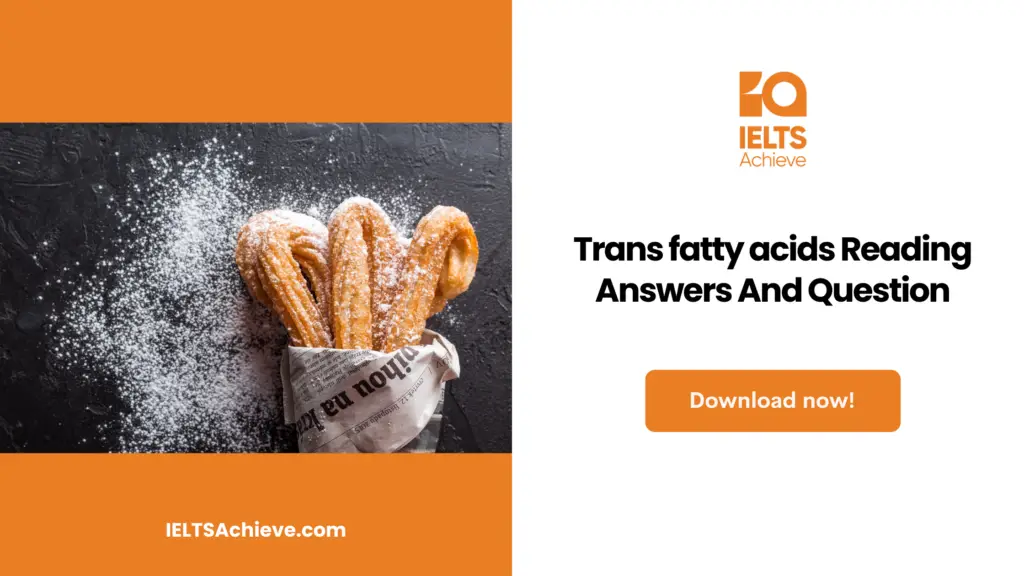The Blog post contains the following IELTS Reading Questions:
- IELTS Reading Multiple Choice Questions
- IELTS Reading True/False or Not Given
- IELTS Reading Sentence Completion
Stay informed and prepared for success – Explore our comprehensive Reading Test Info page to get valuable insights, exam format details, and expert tips for mastering the IELTS Reading section.
IELTS reading passage – Trans fatty acids
Trans fatty acids

Trans fats should be listed on food labels alongside cholesterol and saturated fat, according to a recent editorial published in the British Medical Journal (BMJ) that was written by experts from the University of Oxford. The unsaturated fatty acids include harmful trans fats. Foods made from grazing animals, such as milk, beef, and ham, contain trace levels of them organically. Partly hydroxylation, or turning vegetable oils into semi-solid fats, is the main source of trans fatty acids in the diet. Therefore, you can find them in baked goods, fried dishes, and other highly processed that use hard paraffin or partly saturated cooking oils.
It has been demonstrated that the presence of specific substances in the blood known as lipids, which are affected negatively by trans fatty acids, can lead to an increased risk of developing cardiovascular disease. In addition, they raise levels of LDL cholesterol, also known as the “bad cholesterol,” as well as HDL cholesterol, which is distinguished as the “good cholesterol.” They may also have deleterious repercussions on the risk of cardiovascular disease, which are apart from any impact they could have on the blood’s levels of lipids.
A recent meta-analysis of randomized trials on trans fatty acids discovered that a rise of 2% in energy expenditure from trans lipid enzymes was related to a 23% increase in the prevalence of heart disease. Even at low doses, the investigators found that trans fatty acids had negative consequences (3 percent of total daily energy intake, or about 2 to 7 grams per day). However, the most current findings only revealed that trans fatty acids, which are created when vegetable oils solidify, are unhealthy. Consumption of trans fatty acids through dairy commodities is thought to have comparatively few negative impacts on public health.
Intakes of trans fatty acids by the general population in the UK have decreased over the past decade and are now, on average, significantly below the recommended 2% of total energy established by the Department of Health in 1991, which is 1.2% of energy. This is a significant improvement. This is not to suggest that intakes of trans fatty acids are not still an issue. Dietary guidance advises that persons who are at the high end of the range of intake should still make attempts to minimize their intake. This is not meant to say that intakes of trans fatty acids are not still a problem. The United States labels foods containing trans fatty acids, although the United Kingdom and Europe do not. The European regulation that establishes the structure and content of food labels are being revised to include trans fatty acids, which has been supported by the UK Food Standards Agency. Consumers will thus be able to make better-informed decisions about the foods they eat that will benefit their cardiovascular health.
In recent years, several food producers and merchants have methodically phased trans fatty acids out of their goods due to growing evidence of their negative effects on human health. For instance, because they are no longer used in the production of popular brands of margarine and other fat spreads, they have been removed from these products for some time. In addition, many businesses now follow criteria that lead to the reformulation and reduction or deletion of trans fatty acids in items where they were previously present, such as snack foods and baked goods. As a result, most British-made savory biscuits and crisps don’t use partly hydrogenated oils in their preparation. There are also shifts occurring in the production of baked goods. For instance, in 2004, a large European producer of cookies, cakes, and snacks stated that they would no longer use partly hydrogenated vegetable oils in their products.
Along with these modifications, the producer also noted a decrease in saturates. In order to prevent the same negative health effects from saturated fatty acids, which would be the easy technological solution, avoiding trans fatty acids altogether is a big technical hurdle. Trans fatty acids can be found in foods that have been processed with or include partly hydrogenated oils or fats. This category of foods includes things like biscuits, pastries, and cakes, as well as various fried foods and manufactured bakery goods. It’s indeed essential to note that intake may have changed as a result of the reformulation of foods during the past six years in the United Kingdom, as mentioned above. In addition, the United Kingdom has lower average consumption of trans fatty acids than the United States. This does not mean, however, that there is space for complacency since it is recognized that some parts of the population consume more than is advised.
Unlock your full potential in the IELTS Reading section – Visit our IELTS Reading Practice Question Answer page now!
Recommended Questions:
Renewable Energy IELTS Reading Question with Answer
Trans fatty acids IELTS Reading Questions
Questions 1-4
Do the following statements agree with the information given in Reading Passage 1
True if the statement agrees with the information
False if the statement contradicts the information
Not Given if there is no information on this
- Small levels of trans fatty acid ingestion might result in health issues.
- All forms of meat include trace amounts of trans fatty acids.
- The consumption of foods containing trans fatty acids is continuing its fall in Britain.
- Some people are nevertheless ingesting more trans fatty acids than experts deem safe.
Enhance your skills in identifying information as True, False, or Not Given. Click here to discover expert strategies and techniques for mastering this question type in the IELTS Reading section.
Questions 5-7
Choose the correct option, A, B, C, or D. Write the correct letter in boxes 5-7 on your answer sheet.
5. Which of these is NOT caused by trans fatty acids?
A. High level of bad cholesterol
B. Lack of intestine enzymes
C. Heart disease
D. Damage to blood lipids
6. In the year 1991, a piece of encouraging news was published, which was
A. Plague has completely eliminated
B. Discovery of trans fatty acids substitute
C. Reduction in trans fatty acid consumption
D. Inclined rates of cholesterol in a human body
7. What variables are NOT responsible for causing the constituents of trans fatty acids?
A. Hydrogenated oils
B. Hydrogenated fats
C. Solidification of vegetable oils
D. Non-hydrogenated fats
Ready to improve your performance in Multiple Choice Questions (MCQs)? Click here to access our comprehensive guide on how to tackle MCQs effectively in the IELTS Reading section.
Questions 8-13
Complete the sentences below. Choose NO MORE THAN THREE WORDS from the passage for each answer.
8. Oxford University researchers suggest that __________ contain information concerning trans fatty acids.
9. __________ solidify as the primary source of trans fatty acid during food processing.
10. Consuming trans fatty acids increases one’s risk of acquiring __________.
11. A daily intake maximum of trans fatty acids was set by the UK’s __________.
12. The majority of salty __________ produced in the UK no longer include partially hydrogenated oils.
13. The __________ currently consumes more trans fatty acids than the UK.
Enhance your sentence completion skills in the IELTS Reading section. Click here to access our comprehensive guide and learn effective strategies for filling in missing words or phrases in sentences.
Unlock your full potential in the IELTS Reading section – Visit our IELTS Reading Practice Question Answer page now!
Recommended Questions:
Renewable Energy IELTS Reading Question with Answer
Trans fatty acids Reading Answers
1. True
2. False
3. Not Given
4. True
5. B
6. C
7. D
8. Food labels
9. Vegetable oils
10. Heart disease/cardiovascular disease
11. Department of Health
12. Biscuits and crisps
13. The United States

We hope you found this post useful in helping you to study for the IELTS Test. If you have any questions please let us know in the comments below or on the Facebook page.
The best way to keep up to date with posts like this is to like us on Facebook, then follow us on Instagram and Pinterest. If you need help preparing for the IELTS Test, join the IELTS Achieve Academy and see how we can assist you to achieve your desired band score. We offer an essay correction service, mock exams and online courses.
